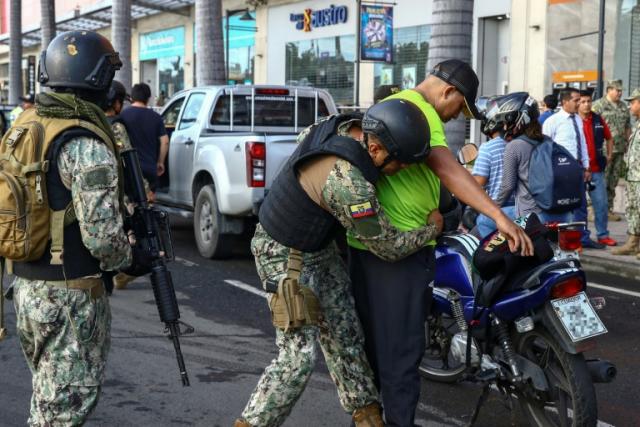The following travel advisory was published by the U.S. Department of State on June 22, 2023. We are reprinting it in its entirety without editorial comment.
Ecuador – Level 2: Exercise Increased Caution
Reissued with updates to the kidnapping indicator and crime information in the provinces of El Oro, Manabí, Santo Domingo, Los Rios, Santa Elena, Cañar, and Carchi.
Exercise increased caution in Ecuador due to civil unrest, crime, and kidnapping. Some areas have increased risk. Read the entire Travel Advisory.
Reconsider travel to:
- Guayaquil north of Portete de Tarquí Avenue due to crime.
- El Oro province outside the cities of Huaquillas and Arenillas, due to crime.
- Los Rios province outside the cities of Quevedo, Quinsaloma, and Pueblo Viejo, due to crime.
- All areas south of Esmeraldas city in Esmeraldas province, due to crime.
- The provinces of Sucumbíos, Manabí, Santa Elena, and Santo Domingo due to crime.
Do not travel to:
- Guayaquil, south of Portete de Tarquí Avenue, due to crime.
- The cities of Huaquillas and Arenillas in the province of El Oro, due to crime.
- The cities of Quevedo, Quinsaloma, and Pueblo Viejo in the province of Los Rios, due to crime.
- Esmeraldas city and all areas north of Esmeraldas city in Esmeraldas province, due to crime.
Country Summary: Crime is a widespread problem in Ecuador. Violent crime, such as murder, assault, kidnapping, and armed robbery, is prevalent and widespread. The rate of violent crime is significantly higher in areas where transnational criminal organizations are concentrated.
Demonstrations occur frequently throughout the country, usually motivated by political and/or economic factors. Demonstrators routinely block local roads and major highways, often without prior notice. Past demonstrations have varied in duration, with some extending for several days or weeks. Blocked roads may significantly reduce access to public transportation, health services, and airports and may disrupt travel both within and between cities.
Outside of Ecuador’s urban and semi-urban population centers, much of the country’s territory is sparsely populated and isolated. First responders’ and U.S. government officials’ access to rural and remote regions of the country is often extremely limited and can lead to significant delays in assistance to U.S. citizens in these areas.
Read the country information page for additional information on traveling to Ecuador.
If you decide to travel to Ecuador:
Enroll in the Smart Traveler Enrollment Program (STEP) to receive Alerts and make it easier to locate you in an emergency.
Follow the Department of State on Facebook, Twitter, and Instagram
Review the Country Security Report for Ecuador.
Prepare a contingency plan for emergency situations. Review the Traveler’s Checklist.
Visit the CDC page for the latest Travel Health Information related to your travel.
Level 4: Do Not Travel
Guayaquil, south of Portete de Tarquí Avenue, due to crime.
The cities of Huaquillas and Arenillas in the Province of El Oro, due to crime.
The cities of Quevedo, Quinsaloma, and Pueblo Viejo in the province of Los Rios, due to crime.
Esmeraldas city and all areas north of Esmeraldas city in Esmeraldas province, due to crime.
Transnational criminal groups and local gangs regularly engage in violent criminal acts in these areas, including indiscriminate attacks without warning in public spaces. Violent crimes have included murder, targeted assassinations, armed robberies, bombings, kidnappings, and assaults, among others. Violence in these areas has steadily increased in frequency and brutality in recent months, posing an increased security risk to U.S. citizens. U.S. government personnel are prohibited from traveling to these areas without prior authorization. As a result, the U.S. government is limited in its ability to provide emergency services to U.S. citizens in these areas.
Level 3: Reconsider Travel
Guayaquil north of Portete de Tarquí Avenue, due to crime.
El Oro province outside the cities of Huaquillas and Arenillas, due to crime.
Los Rios province outside the cities of Quevedo, Quinsaloma, and Pueblo Viejo, due to crime.
All areas south of Esmeraldas city in Esmeraldas province, due to crime.
The provinces of Sucumbíos, Manabí, Santa Elena, and Santo Domingo, due to crime.
Transnational criminal groups and local gangs have sporadically engaged in violent criminal activity in these areas, with violence increasing in recent months. U.S. government personnel are directed to exercise extreme caution and maintain increased vigilance when traveling in and around these areas.



This really is a shame. Ecuador is such a beautiful country, and at one time it was my retirement plan to move there.
I visited for many years through the early 90s up to 2010, and there were always protests to get something accomplished (gas price increases, and boot a corrupt president), but now, it seems the violent crime level has increased quite a bit.
The drug cartels will always look for the path of least resistance, and unfortunately, Ecuador is that path at the moment. This is, and will continue to, increase the levels of violent crime there for the foreseeable future.
What crap!